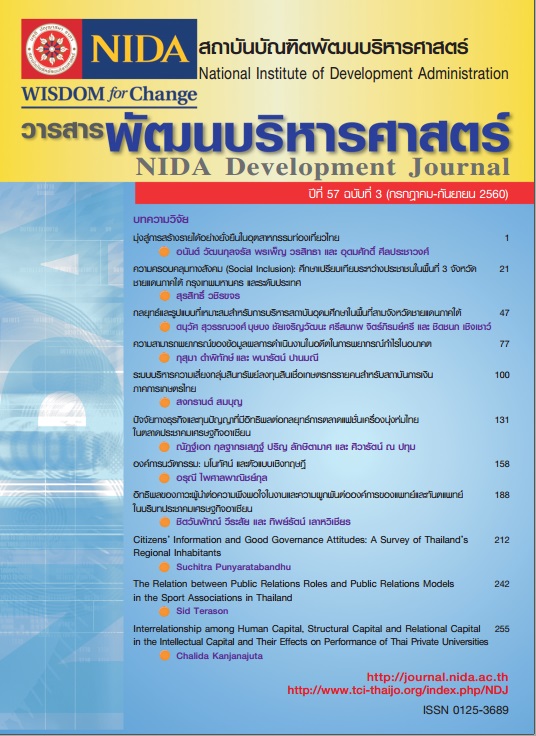Interrelationship among human capital, structural capital and relational capital in the intellectual capital and their effects on performance of Thai Private Universities
Keywords:
Intellectual Capital, Human Capital, Structural Capital, Relational Capital, University Performance, ทุนทางปัญญา, ทุนมนุษย์, ทุนทางโครงสร้าง, ทุนความสัมพันธ์, การปฏิบัติงานของมหาวิทยาลัยAbstract
Today the major role of intellectual capital (comprise of human capital, structural capital and relational capital) that effects and impacts on performance and sustainability in every organization is becoming more and more prominent. It is represented and promoted as the organization's most valuable resource for establishing the sustainable business and organization’s wealth; also it is recognized as the most important source of organizations' competitive advantage in bloody business world. Many researchers also agree and approve that intellectual capital is “knowledge” and “experience” that directly contribute to every organization’s bottom line, as well as mainly contribute to an organization’s survivability and sustainability.Today the major role of intellectual capital (comprise of human capital, structural capital and relational capital) that effects and impacts on performance and sustainability in every organization is becoming more and more prominent. It is represented and promoted as the organization's most valuable resource for establishing the sustainable business and organization’s wealth; also it is recognized as the most important source of organizations' competitive advantage in bloody business world. Many researchers also agree and approve that intellectual capital is “knowledge” and “experience” that directly contribute to every organization’s bottom line, as well as mainly contribute to an organization’s survivability and sustainability. Most IC researches have been conducted in a variety of international settings such as in Europe, USA, and Asia. However, no empirical research has been conducted at the organizational level in the field of IC in Thai educational sector. The purpose of this empirical study is to emphasize the importance of intellectual capital and the main objective is to explore the interrelationship among three components of intellectual capital and their effects on performance within the private educational institutions of Thailand. Model development and hypothesis testing was conducted using path analysis on a sample of 131 respondents from 19 Thai private universities. Results demonstrate a confirmation of previous studies as it relates to hypothesis testing but a difference in psychometric item evaluation given the distinctive geographical and sector context. Recommendations are then made for both researchers and practitioners.
ความสัมพันธ์ระหว่างทุนมนุษย์ ทุนทางโครงสร้างและทุนความสัมพันธ์ที่อยู่ในทุนทางปัญญา และผลกระทบที่มีต่อการปฏิบัติงานของมหาวิทยาลัยเอกชนไทย
บทคัดย่อ
บทบาทสำคัญของทุนทางปัญญา(ซึ่งประกอบด้วยทุนมนุษย์ ทุนทางโครงสร้าง และทุนความสัมพันธ์)ที่ส่งผลกระทบต่อการปฏิบัติงานและต่อความยั่งยืนของทุกองค์การกำลังกลายเป็นสิ่งที่แสดงออกให้เห็นอย่างชัดเจนมากยิ่งขึ้นเรื่อยๆในปัจจุบันนี้ ทุนทางปัญญาได้ถูกนำเสนอว่าเป็นทรัพยากรที่มีคุณค่ามากที่สุดขององค์กรในอันที่จะสร้างความร่ำรวยและความยั่งยืนให้แก่องค์กร อีกทั้งยังถือเป็นทรัพยากรที่จะก่อให้เกิดการมีข้อได้เปรียบทางการแข่งขันในโลกธุรกิจที่มีความรุนแรงมากขึ้น นักวิจัยส่วนใหญ่ล้วนเห็นด้วยและยอมรับว่าทุนทางปัญญาก็คือ “ความรู้” และ “ประสบการณ์”ที่ส่งผลโดยตรงกับรากฐานขององค์กรและในขณะเดียวกันก็ส่งผลต่อความอยู่รอดและความยั่งยืนขององค์กรด้วยบทบาทสำคัญของทุนทางปัญญา(ซึ่งประกอบด้วยทุนมนุษย์ ทุนทางโครงสร้าง และทุนความสัมพันธ์)ที่ส่งผลกระทบต่อการปฏิบัติงานและต่อความยั่งยืนของทุกองค์การกำลังกลายเป็นสิ่งที่แสดงออกให้เห็นอย่างชัดเจนมากยิ่งขึ้นเรื่อยๆในปัจจุบันนี้ ทุนทางปัญญาได้ถูกนำเสนอว่าเป็นทรัพยากรที่มีคุณค่ามากที่สุดขององค์กรในอันที่จะสร้างความร่ำรวยและความยั่งยืนให้แก่องค์กร อีกทั้งยังถือเป็นทรัพยากรที่จะก่อให้เกิดการมีข้อได้เปรียบทางการแข่งขันในโลกธุรกิจที่มีความรุนแรงมากขึ้น นักวิจัยส่วนใหญ่ล้วนเห็นด้วยและยอมรับว่าทุนทางปัญญาก็คือ “ความรู้” และ “ประสบการณ์”ที่ส่งผลโดยตรงกับรากฐานขององค์กรและในขณะเดียวกันก็ส่งผลต่อความอยู่รอดและความยั่งยืนขององค์กรด้วย นักวิจัยเรื่องทุนทางปัญญาส่วนใหญ่ได้ทำการวิจัยเรื่องนี้ในหลายประเทศทั่วโลก เช่นในประเทศแถบยุโรป อเมริกา และในเอเชีย แต่กลับไม่มีการทำวิจัยเกี่ยวกับเรื่องนี้ในองค์กรทางภาคการศึกษาของไทยเลย ดังนั้นจุดประสงค์ของงานวิจัยชิ้นนี้ก็เพิ่อเน้นให้เห็นถึงความสำคัญของทุนทางปัญญาโดยมุ่งเน้นที่จะสำรวจความสัมพันธ์ภายในระหว่าง3องค์ประกอบหลักของทุนทางปัญญา และผลกระทบที่มีต่อการปฏิบัติงานของมหาวิทยาลัยเอกชนของประเทศไทย การพัฒนาตัวแบบและการทดสอบสมมุติฐานทำขึ้นโดยใช้วิธีการวิเคราะห์ส้นทางจากตัวอย่างของผู้ตอบ 131 คนจาก 19 มหาวิทยาลัยเอกชนไทย ผลจากการวิจัยยังคงยืนยันผลครงตามผลการวิจัยก่อนๆแม้จะต่างภูมิภาคและต่างส่วนงานกันก็ตาม ข้อเสนอแนะทำขึ้นเพื่อทั้งนักวิจัยและผู้ปฏิบัติ





